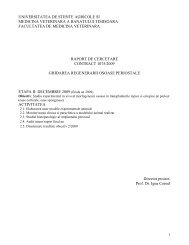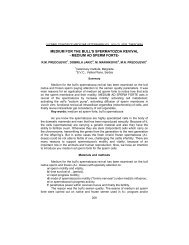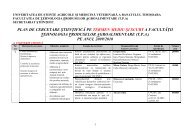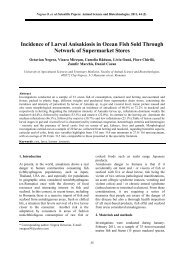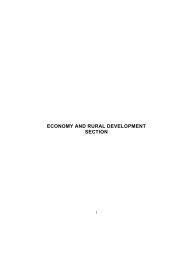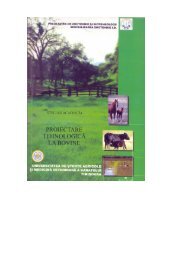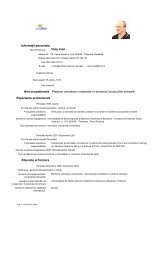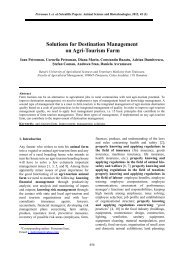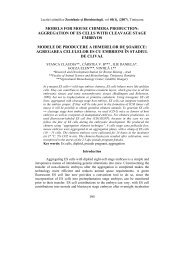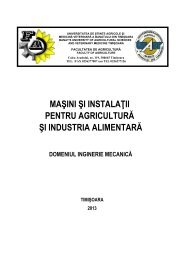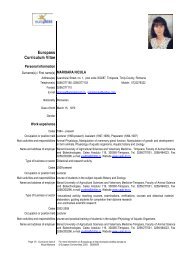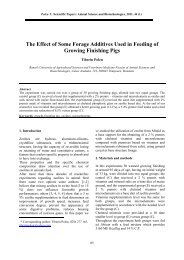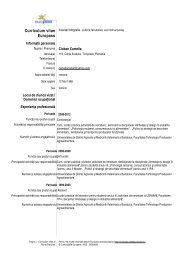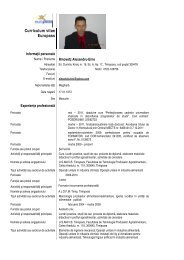journal of linguistic studies
journal of linguistic studies
journal of linguistic studies
You also want an ePaper? Increase the reach of your titles
YUMPU automatically turns print PDFs into web optimized ePapers that Google loves.
factors. Stoichiţoiu (2001) claims that the <strong>linguistic</strong> conscience <strong>of</strong> a Romanian speaker<br />
who can also speak English and his/her “pride” to spell a borrowed word à l’anglaise fall<br />
into the category <strong>of</strong> psychological factors that impede orthographical adaptation.<br />
Among the socio-<strong>linguistic</strong> factors, an important part is played by the inner<br />
motivations <strong>of</strong> various groups <strong>of</strong> speakers concerning the terminology they use.<br />
Stoichitoiu (2001) also expounds the situation <strong>of</strong> experts for whom the preservation <strong>of</strong><br />
borrowings, from different special-field vocabularies, in their original form, is<br />
engendered by their universal usage and by their common purpose <strong>of</strong> communication<br />
among pr<strong>of</strong>essionals. “Stylistic” (connotative) Anglicisms preserve their original spelling<br />
due to their power <strong>of</strong> suggestion, to their expressive force (this can be clearly remarked in<br />
the language <strong>of</strong> the press as well as that <strong>of</strong> the young people), to “the prestige” <strong>of</strong> the<br />
English word. This category <strong>of</strong> borrowings is the richest <strong>of</strong> the three, as far as examples<br />
are concerned. It entails borrowed words pertaining to various fields <strong>of</strong> activity:<br />
- sports and games: badminton, soccer, bowling, jogging, fitness team, corner,<br />
outsider;<br />
- economics, trade, finance: management, manager, know-how, business, brand,<br />
joint venture, marketing, merchandiser, merchandising, leasing, investmentbanking,<br />
home-banking, broker, advertising, charter, cash, stand-by, voucher;<br />
- IT: computer, mouse, hard disk, hardware, s<strong>of</strong>tware, server, scanner, laptop,<br />
driver, floppy disk, site, e-mail, etc.;<br />
- music, movies: rock, rap, musical, music-hall, horror, thriller, western, sciencefiction,<br />
blues, etc.;<br />
- food and drinks: hamburger, hotdog, cheeseburger, snacks, toast, ketchup, chips,<br />
brandy, cherry-brandy, scotch, whisky, etc.;<br />
- the language <strong>of</strong> newspapers: leasing, catering, entertainment, dealer, design,<br />
trend, agreement, internet, cash & carry, training, marketing manager, brand,<br />
supermarket, business, handset, shopping centre, etc. (Bursa, 140, July 19 th 2005;<br />
Capital, 9, March 2 nd 2006; Capital, 10, March 9 th 2006).<br />
There are borrowed words that have a hybrid spelling (they combine the etymological<br />
spelling and the foreign pronunciation):<br />
- punci < E punch [pÃntS];<br />
- the English word bungalow [bÃNg«l«U] was recorded in DEX (1998) with<br />
the hybrid spelling bungalou but in DOOM (2005) this word has an etymological<br />
spelling;<br />
- aisberg < iceberg [aIsbÎùg]: the former part (“ais”) <strong>of</strong> this borrowing is spelled<br />
according to the English pronunciation [aIs], while the latter part <strong>of</strong> this word<br />
(“berg”) has preserved the etymological spelling;<br />
- beatnic < beatnik [biùtnIk]: in this case, the etymological spelling is preserved in<br />
the former part <strong>of</strong> the borrowing and the phonetic spelling is rendered in the latter<br />
half.<br />
Currently, very few English borrowings have a hybrid spelling because the tendency<br />
<strong>of</strong> contemporary literary Romanian is to employ these borrowings with their original,<br />
etymological spelling. DOOM (2005) records most <strong>of</strong> the English borrowings with their<br />
etymological spelling, even some <strong>of</strong> those that were recorded in DEX (1998) with a<br />
hybrid spelling or a phonetic one, for example:<br />
- dandi (DEX 1998) – hybrid spelling;<br />
- dandy (DOOM 2005) – etymological spelling;<br />
- parching (DEX 1998) – the English “k” is replaced with the group <strong>of</strong> letters “ch”;<br />
30



